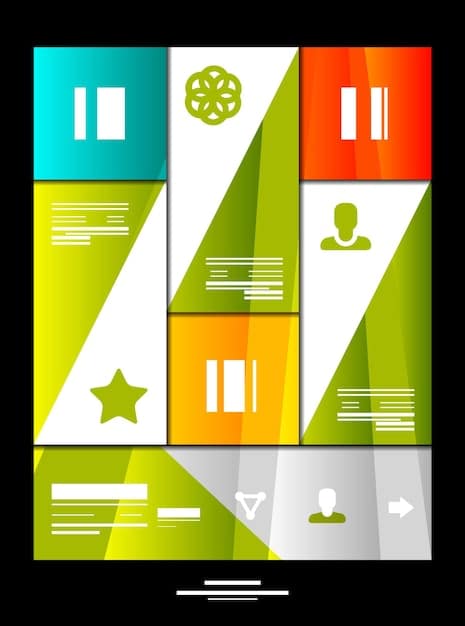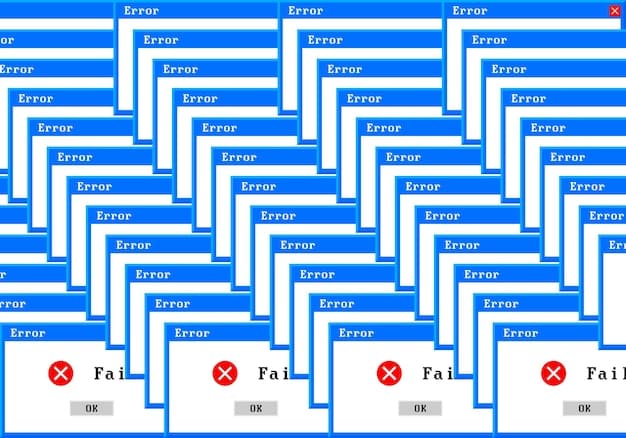Note-Taking Apps in 2025: Are You Wasting Time?

Finding the right note-taking app is crucial for US professionals in 2025; an inefficient app can drain productivity. This comparison of the top three options helps you decide which app will save you time and boost your workflow, tailored for the modern professional.
Is your current note-taking app a productivity booster or a time sink? In 2025, with countless digital tools available, choosing the right one is more critical than ever for US professionals. This article dives deep into a comparison of the top three note-taking apps that could revolutionize how you work, helping you determine if your current app is costing you time. Let’s explore whether your note-taking app is costing you time? A comparison of the top 3 options for US professionals in 2025.
Choosing the Right Note-Taking App in 2025
In today’s fast-paced work environment, the right note-taking app can be a game-changer. But with so many options available, how do you choose the one that best suits your needs? This section will delve into the key features and considerations to keep in mind when selecting a note-taking app, ensuring it enhances rather than hinders your productivity.
For US professionals in 2025, the stakes are higher than ever. Remote work, collaboration, and the sheer volume of information demand tools that are both powerful and intuitive. Let’s start by looking at what makes a note-taking app truly effective.
Key Features to Look For
When evaluating a note-taking app, consider these essential features:
- Cross-Platform Compatibility: Can you access your notes on all your devices?
- Search Functionality: How easily can you find specific information within your notes?
- Organization Tools: Does the app offer features like tags, folders, or notebooks to keep your notes organized?
These features are fundamental for ensuring the app fits seamlessly into your workflow. The app should adapt to your needs, not the other way around.
Why Customization Matters
Every professional has unique needs. A one-size-fits-all approach rarely works when it comes to productivity tools. Look for apps that offer a good degree of customization. Can you adjust the font, theme, or layout to create a comfortable and efficient writing environment? Some apps even allow you to create custom templates for different types of notes, which can save you considerable time in the long run.
Ultimately, the best note-taking app is the one that feels like a natural extension of your thought process. It should disappear into the background, allowing you to focus on capturing and organizing your ideas without distraction. As the digital landscape evolves, it’s vital to make informed choices that will optimize your time and efforts.
In conclusion, when choosing a note-taking app in 2025, focus on cross-platform compatibility, search functionality, organization tools, and customization options. By carefully considering these features, you can find an app that not only meets your needs but also enhances your overall productivity.
Top 3 Note-Taking Apps for US Professionals: A Detailed Comparison
Now, let’s get into the specifics. Which note-taking apps are truly standing out in 2025? We’ve narrowed it down to three contenders: Evernote, OneNote, and Notion. Each offers a unique approach to note-taking, so let’s compare them based on key criteria.
This section will break down each app’s strengths, weaknesses, and unique features, helping you make an informed decision about which one is the best fit for your professional needs in the US market.

Evernote
Evernote has long been a favorite for professionals needing a robust and versatile note-taking solution. Known for its extensive features and organizational capabilities, Evernote continues to be a strong contender in 2025. Its ability to handle various types of content makes it a powerful tool for many users.
- Pros: Excellent organization features, web clipping, robust search.
- Cons: Can be expensive, interface may feel cluttered for some.
- Best For: Users who need to manage a large volume of diverse information.
OneNote
As part of the Microsoft Office suite, OneNote offers seamless integration with other Microsoft products, making it an attractive option for many US professionals. Its flexible canvas and freeform note-taking style appeal to those who prefer a more visual approach.
- Pros: Free (with a Microsoft account), excellent integration with Microsoft ecosystem, flexible canvas.
- Cons: Search functionality not as robust as Evernote, can feel less structured.
- Best For: Users who are heavily invested in the Microsoft ecosystem and prefer free-form note-taking.
Notion
Notion has gained significant popularity in recent years due to its versatility and all-in-one workspace approach. Combining note-taking, project management, and database capabilities, Notion is a powerful choice for US professionals looking to streamline their workflow.
- Pros: Highly customizable, combines note-taking with project management, modern interface.
- Cons: Steeper learning curve, can be overwhelming for simple note-taking.
- Best For: Users who want an all-in-one workspace and are willing to invest time in learning the app.
In summary, each of these apps offers a unique set of features and benefits. Evernote is excellent for organization and web clipping. OneNote is ideal for those in the Microsoft ecosystem, and Notion is perfect for users seeking an all-in-one workspace. Choosing the right one depends on your individual needs and preferences.
Evaluating User Interface (UI) and User Experience (UX)
The user interface (UI) and user experience (UX) of a note-taking app can significantly impact your productivity. A poorly designed interface can lead to frustration and wasted time, while a well-designed one can enhance your efficiency and make note-taking a seamless experience. Let’s break down the UI/UX of our top three contenders.
For US professionals in 2025, time is of the essence. An app that’s intuitive and easy to navigate is crucial for staying productive and focused on the task at hand.
Evernote’s UI/UX
Evernote’s UI has evolved over the years, but it generally maintains a consistent, structured approach. The navigation is straightforward, with notebooks and tags readily accessible. However, some users find the interface cluttered, especially with the abundance of features. The UX can feel less intuitive for new users, requiring some time to learn the ropes.
Users looking for a traditional note-taking experience will appreciate Evernote’s familiar layout, but those seeking a more modern and streamlined interface may find it lacking.
OneNote’s UI/UX
OneNote offers a more free-form canvas, allowing users to place notes anywhere on the page. This can be both a blessing and a curse. While it provides immense flexibility, it can also lead to a disorganized mess if not managed properly. The UI is relatively clean, and the integration with other Microsoft products is seamless. The UX is generally positive, particularly for users already familiar with the Microsoft ecosystem.
OneNote’s UI/UX caters to those who prefer a more visual and unstructured approach to note-taking, making it a great option for brainstorming and idea generation.
Notion’s UI/UX
Notion boasts a modern and highly customizable UI. Its block-based system allows you to create complex layouts and workflows tailored to your specific needs. However, this level of customization comes with a steeper learning curve. New users may find the initial setup overwhelming, but once mastered, Notion’s UX can be incredibly powerful.
- Pros: Modern design, highly customizable, block-based system.
- Cons: Steeper learning curve, can be overwhelming for beginners.
- Best For: Users who want a versatile and customizable workspace.

In conclusion, the best UI/UX depends on your personal preferences and technical aptitude. Evernote offers a structured approach, OneNote provides a free-form canvas, and Notion delivers a highly customizable experience. Take the time to explore each app and see which one feels most natural to you.
Integration with Other Productivity Tools
In 2025, note-taking apps rarely exist in isolation. Seamless integration with other productivity tools is essential for streamlining your workflow and maximizing efficiency. This section will explore how Evernote, OneNote, and Notion integrate with other popular apps and platforms.
For US professionals juggling multiple tasks and tools, the ability to connect your note-taking app with your calendar, email, and project management software can save you countless hours and reduce unnecessary friction.
Evernote Integrations
Evernote offers a wide range of integrations with third-party apps, including Google Calendar, Slack, and Microsoft Teams. These integrations allow you to connect your notes with your schedule, communication channels, and collaborative projects. Evernote’s web clipper also makes it easy to save articles and web pages directly to your notes, further enhancing its versatility.
These integrations make Evernote a powerful hub for centralizing information and streamlining your workflow.
OneNote Integrations
As part of the Microsoft Office suite, OneNote seamlessly integrates with other Microsoft products, such as Word, Excel, and Outlook. You can easily embed documents, spreadsheets, and emails directly into your notes, creating a unified workspace for all your professional activities. OneNote also offers integrations with third-party apps, but the selection is not as extensive as Evernote’s.
For users heavily invested in the Microsoft ecosystem, OneNote’s tight integration with other Microsoft products makes it a natural choice.
Notion Integrations
Notion offers a unique approach to integration, allowing you to create custom workflows and connect with a wide range of third-party apps through its API. While the native integrations may not be as extensive as Evernote’s, Notion’s flexibility and open architecture allow you to build custom integrations tailored to your specific needs. Popular integrations include Google Drive, Slack, and Trello.
You can connect Notion with virtually any app or platform that offers an API, making it a powerful tool for automation and workflow optimization.
- Evernote: Wide range of third-party integrations, web clipper.
- OneNote: Seamless integration with Microsoft Office suite.
- Notion: Customizable integrations via API, connects with Google Drive, Slack, Trello.
Ultimately, the best integration strategy depends on your existing toolkit and workflow. Consider which apps you use most frequently and choose a note-taking app that integrates seamlessly with them. This will help you create a more efficient and productive work environment.
In summary, when choosing a note-taking app, don’t overlook its integration capabilities. Seamless integration with other productivity tools can save you time and help you stay organized.
Pricing and Subscription Models
Understanding the pricing and subscription models of note-taking apps is crucial for making an informed decision. While some apps offer a free tier, it often comes with limitations on storage, features, or device access. This section will break down the pricing structures of Evernote, OneNote, and Notion, helping you determine which one offers the best value for your money.
For US professionals operating on a budget, or those requiring expansive features, it’s important to understand the total cost of ownership beyond initial subscriptions.
Evernote Pricing
Evernote offers a free plan with limited features and storage. For more advanced features and increased storage, you’ll need to subscribe to one of their paid plans. Evernote’s pricing can be a bit on the higher side compared to other note-taking apps, but it’s worth it if you need its extensive organizational capabilities and web clipping features.
Consider carefully what you need before committing to a paid subscription.
OneNote Pricing
OneNote is completely free to use with a Microsoft account. This makes it an incredibly attractive option for budget-conscious users. While it might not offer all the advanced features of Evernote or Notion, it provides a solid note-taking experience at no cost.
Being free, OneNote also comes with a level of integration with the Microsoft 365 suite.
Notion Pricing
Notion offers a free plan for personal use with some limitations. To unlock more features and collaboration options, you’ll need to subscribe to one of their paid plans. Notion’s pricing is competitive, and its versatility makes it a great value for those who want an all-in-one workspace.
- Evernote: Free plan with limitations, paid plans for more features.
- OneNote: Completely free with a Microsoft account.
- Notion: Free plan for personal use, paid plans for collaboration and advanced features.
When evaluating the pricing models, consider your individual needs and budget. A free plan might be sufficient for simple note-taking, but if you need more storage, advanced features, or collaboration options, you’ll likely need to upgrade to a paid subscription. Weigh the features against the cost to determine which app offers the best value for you.
Consider the long-term cost and scalability of each option.
Security and Privacy Considerations
In 2025, security and privacy are paramount concerns for professionals using note-taking apps. Ensuring your sensitive information is protected from unauthorized access and data breaches is crucial. This section will explore the security and privacy features of Evernote, OneNote, and Notion, helping you make an informed decision about which app best safeguards your data.
For US professionals handling confidential client information or proprietary business data, choosing a note-taking app with robust security measures is non-negotiable.
Evernote Security
Evernote employs industry-standard security measures to protect user data, including encryption and two-factor authentication. However, Evernote has faced criticism in the past for its privacy policies, particularly regarding employee access to user notes. While they have since updated their policies, it’s essential to review their current terms of service and understand how they handle your data.
Keep track of how the security services continue to evolve for user protection.
OneNote Security
OneNote benefits from Microsoft’s robust security infrastructure, including encryption and compliance with industry standards. As part of the Microsoft ecosystem, OneNote adheres to strict privacy policies and offers advanced security features, such as data loss prevention and access controls.
Professionals heavily invested in the Microsoft ecosystem find OneNote to be an excellent option.
Notion Security
Notion employs industry-standard security measures, including encryption and regular security audits. They also offer two-factor authentication and SOC 2 compliance. Notion’s privacy policy is transparent, but it’s essential to review it carefully to understand how they collect, use, and share your data.
Security is critical to protect the confidential data of users working in high-value industries.
- Evernote: Encryption, two-factor authentication, updated privacy policies.
- OneNote: Microsoft’s robust security infrastructure, data loss prevention.
- Notion: Encryption, two-factor authentication, SOC 2 compliance.
Before entrusting your sensitive information to any note-taking app, take the time to evaluate its security and privacy features. Review their terms of service, understand their data handling practices, and ensure they employ industry-standard security measures to protect your data. Prioritizing security and privacy will help you mitigate the risk of data breaches and maintain your professional integrity.
Always balance convenience with your risk tolerance for security threats.
| Key Aspect | Brief Description |
|---|---|
| ⏱️ Time Saving | Choosing an efficient app can significantly reduce time spent on organization and searching. |
| ⚙️ Integrations | Seamless integration with other apps streamlines workflow and centralizes information. |
| 🔒 Security | Robust security features protect sensitive information from unauthorized access. |
| 💰 Pricing | Consider the free vs. paid plans to find the best value for your needs. |
Frequently Asked Questions
▼
OneNote is generally considered the easiest to learn due to its simple interface and integration with the familiar Microsoft Office suite. Evernote is also relatively straightforward, but Notion has a steeper learning curve.
▼
Evernote is known for its robust search capabilities, which allow you to quickly find specific information within your notes. It supports advanced search operators and can even search within images and PDFs.
▼
Yes, all three apps offer offline access to your notes. You can create and edit notes even without an internet connection, and they will sync automatically when you reconnect.
▼
Notion is particularly well-suited for collaboration, thanks to its versatile workspace and project management features. It allows multiple users to work on the same notes and databases simultaneously.
▼
Yes, Evernote, OneNote, and Notion all have mobile apps available for both iOS and Android devices. This allows you to access and edit your notes on the go, ensuring you stay productive wherever you are.
Conclusion
Choosing the right note-taking app is a critical decision for US professionals in 2025. By carefully considering your individual needs, budget, and security requirements, you can select an app that enhances your productivity and streamlines your workflow. Whether you prefer the robust organization of Evernote, the seamless integration of OneNote, or the versatility of Notion, the key is to find the app that best fits your unique needs.





